



The Welsh Terrier, also known as the Old English Terrier comes from Wales. It is part of the AKC/UKC, Terrier Group. This breed came in to existence during the 1700’s, and was used to fox hunt, catch badger, and otters.
Brief History
The Welsh Terrier has fierce jaws, and good digging skills. They were used to dig up badger lairs, and also as companion dogs. Today, this breed is mostly a companion dog. The Welsh Terrier first arrived in the U.S during the 19th century. Two older dog breeds: Old English Black and Tan Terrier, are believed to be related to the Welsh Terrier.
Physical Description
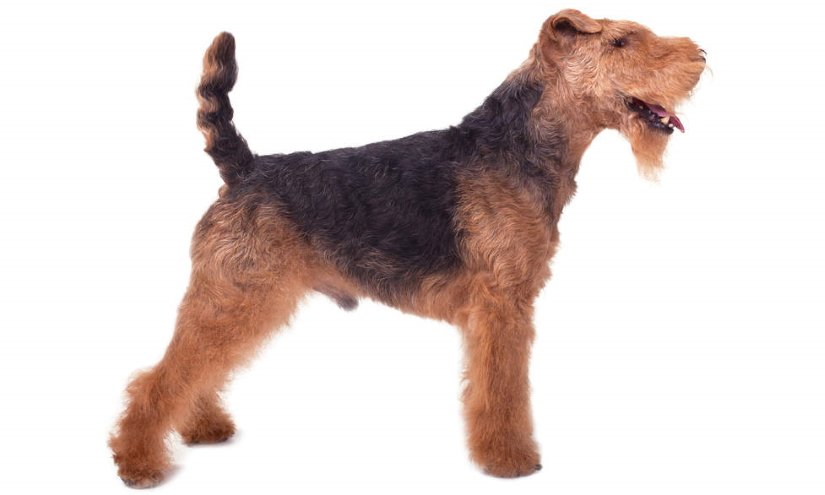
The Welsh Terrier is a compact, and sturdy dog breed. It is a medium–sized rugged looking dog breed that is square looking. With a rectangular head, and square muzzle, the Welsh Terrier has a coarse, wire-textured coat. The muzzle is half the head length, and is powerful and strong. The nose is black and square shaped. The tail is docked, and has ears which are, V-shaped and folded forward. The coat is wiry, with a thick outer coat. The legs, underbody, and head are tan in color. The jacket is black or grizzle, with a tan base. The movement is forward moving. The temperament is friendly, and outgoing.
Temperament
The Welsh Terrier is friendly and outgoing. It is feisty, and has many unique quirks. The Welsh Terrier is easy- to- train, alert, and game to try new activities. This dog breed shows self-restraint, and is also intelligent. The Welsh Terrier is a friendly and amiable dog breed that likes people, and other animals. This breed does well with children. Although the Welsh Terrier has a pronounced prey instinct, and will chase and roam, this dog breed when positively trained and socialized, is one of the easiest dog breeds to live with. This breed is capable of being a superb companion dog, and is totally loyal.
The Welsh Terrier does best with lots of exercise, and a fenced and secure garden or backyard. This is a very sensitive dog breed that needs tons of positive reinforcement, and does well with lots of attention and affection. Care must be given to ensure that all fencing in backyards and gardens is secure. This dog breed tends to beneath fencing. The Welsh Terrier does well with lots of off-leash running. They enjoy playing Frisbee, and ball.
Special Needs

The Welsh Terrier needs an active home. This breed does well with plenty of regular exercise, positive dog training and socialization. The Welsh Terrier breed needs to be socialized from puppyhood, and should never be isolated from people, other dogs and animals. This breed bonds closely with all family members, including children.
The Welsh Terrier needs to constantly interact with people so that he does not become bored and mischievous. Positive training needs to tailor the specific temperament of this breed. The Welsh Terrier is a happy and outgoing dog breed. That said, because it is also alert and energetic, this dog breed has to have lots of environmental stimulation combined with exercise. It needs an experienced dog parent that can be firm, yet kind. Interactive dog toys are a plus for the Welsh Terrier. If excessive barking is a problem, food dispensing dog toys help with boredom.
All family members need to be on the same page with positive dog training methods. Although it may be difficult to not spoil this dog breed, it’s best to be on the same page as the rest of the family about what your Welsh Terrier is and is not allowed to do at home. The Welsh Terrier should live indoors, and may have housetraining issues if not trained positively beginning at puppyhood.
Possible Health Concerns
The Welsh Terrier is a healthy dog breed that may be susceptible to the following health conditions:
- Legg-Perthes Disease. This is the deterioration of the top of the femur that is often seen in smaller dog breeds like the Welsh Terrier. It is characterized by a lack of blood supply and destruction of the blood vessels of the bone. It is a hereditary condition in some terrier breeds. The sudden loss of blood supply to the femur leads to the collapse of the top of the femur bone. Veterinary treatment usually involves the surgical removal of the affected femoral head and neck, and physical therapy so as to stimulate limb usage.
- Dental Problems. The Welsh Terrier needs proper dental care, including preventative methods like daily tooth brushing, which will help prevent gum disease, periodontitis and endodontic disease.
- Skin Allergies: The Welsh Terrier may be prone to Atopic Dermatitis. This is caused by an abnormal immune system response. There are many allergies which can affect the skin, and are caused by fleas, dog food and other allergens like pollen in the air. Consult with your veterinarian if your dog suffers from intense itching.
- Hip Dysplasia is the abnormal development of the hip joint in large dog breeds like the Welsh Terrier. It is generally characterized by a loose joint, and then degenerative joint disease. The Welsh Terrier should be fed a high-quality diet that is geared towards their life stage. A puppy Welsh Terrier should only be fed high-quality puppy dog food. Excessive growth, types of exercise, nutritional factors, and hereditary factors all come in to play with hip dysplasia. Ask your vet for the best nutritional advice for active dogs like the Welsh Terrier.
- Epilepsy is an inherited disease that causes seizures. The Welsh Terrier will generally require treatment with anticonvulsants from their veterinarians.
- Primary Lens Luxation (PLL) This is an inherited disease that affects the eye. It is associated with the disintegration of the zonule fibers that hold the lens in place. It is painful, and may result in blindness.
Exercise
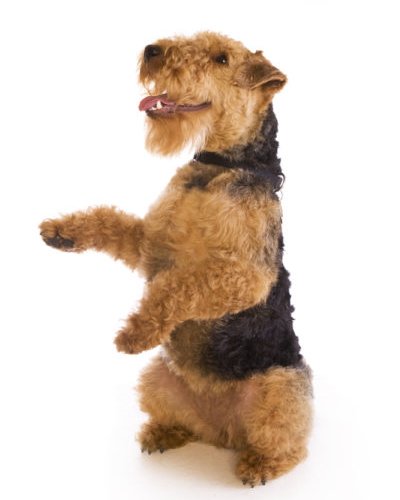
The Welsh Terrier is an energetic dog breed that does well with plenty of regular exercise, and canine sporting activities. Canine sports like agility, obedience, dock diving, Earthdog Trials, conformation shows, therapy work, Search and rescue work, canine freestyle, and even lure coursing will allow for your Welsh Terrier to expend his energy. Herding and Frisbee are also stress-free ways that your dog can have fun. That said, some of the best activities you can have with your dog are unorganized like going out for a jog with your dog. Plan hikes and vigorous exercise for cool mornings. Long relaxed walks around the neighborhood are also enjoyed, and will help alleviate problem behaviors related to excess energy.
Nutrition
The Welsh Terrier enjoys grilled salmon with brown rice and steamed veggies. Additionally, grilled chicken or organic beef with quinoa and veggies are a favorite as well. There are many recipes for home- cooked meals for your dogs online.
A high-quality dog food for the appropriate life stage is recommended for the Welsh Terrier. Pet parents should never underestimate the importance of a well-balanced diet for this small and spirited breed. That said, a dog food that works for one dog, may not work for another. Welsh Terrier dog parents should assess their dog’s activity level, age, breed, and any medical conditions that he or she may be prone to.
With options like bison, duck, venison, quail, wild boar, lamb, salmon and turkey, dog food brands offer unique and unusual protein sources that are healthy for active dogs, dogs with allergies, senior dogs, puppies, and dogs with medical conditions. Consult with your veterinarian if your dog has possible food allergies.
Some dog food formulas contain probiotics, salmon oil, and guaranteed calcium and phosphorus levels to help support healthy development of your pup’s teeth and bones.
For older dogs, look for recipes that offer glucosamine and chondroitin for hip and joint wellness. The protein options can include turkey and chickpea stew, salmon and chickpea stew, and a chicken with chickpea with no artificial flavors, corn, or soy in the ingredients. Consult with your veterinarian for the very best nutritional advice for your Welsh Terrier!
Grooming
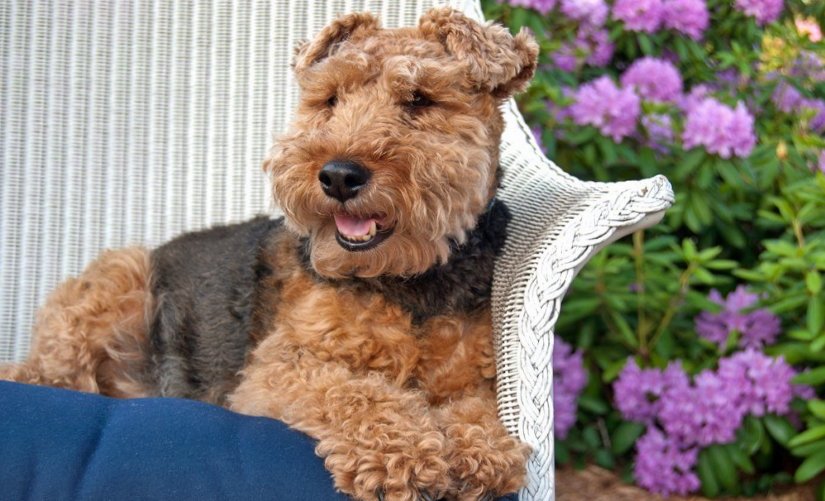
If clipping, this should be done every 8-12 weeks. The Welsh Terrier’s coat should be kept longer or unclipped in colder weather. Canine sweaters and jackets are available in numerous sizes. Opting for a professional dog groomer helps with maintaining coat health at all times.
Routine daily grooming will keep the Welsh Terrier’s coat in superb condition. This breed is one of the easiest breeds to groom. A short- bristled brush or mitt should be used to maintain a shiny and healthy coat. This dog breed enjoys frequent baths, and having his teeth done daily. Dog parents to this breed most often visit a professional groomer for expert clipping. Twice yearly visits to the veterinarian for dental hygiene maintenance is a must. Ears need to be regularly wiped out, and nails trimmed regularly. If your dog does not enjoy having his nails trimmed, try out a nail grinder.
Adopting a Welsh Terrier
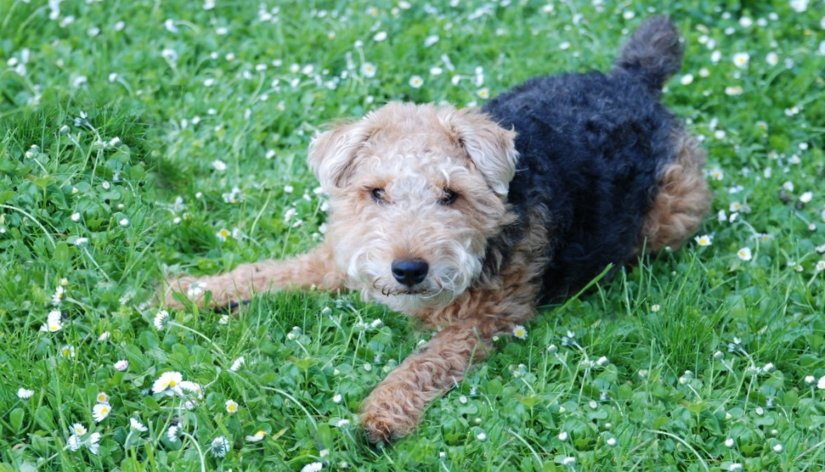
Welsh Terriers make for a wonderful adoption. This dog breed is very energetic. This feisty and adorable dog breed does well with city or farm living. These dogs make for the ultimate travel companion because they are so adaptable. They also love adventure, and get really excited when traveling. As with all terriers, it’s best to supervise when out and about to make sure that they don’t stray, and that all fences are secure.
Terriers are well known for digging underneath fences and escaping. Before going out and adopting, make a list of what you’re looking for in a dog. You will need to think about activity levels, the amount of time available to exercise your dog, and your financial resources.
Whether you’re adopting a Welsh Terrier or a German Shepherd, make sure that you have the time, patience, and the right home environment for your new furry best friend. There are numerous positive dog training programs for adolescent dogs, and for dog breeds that have high activity levels at shelters today. Many shelters also train dogs that arrive at their shelters, so that dogs will have an easier time adjusting to their new homes. If you’re a busy potential dog parent, make sure that you opt for a dog breed that matches your lifestyle. Ultimately, both family and pooch will have various lifestyle adjustments to make. Understanding your new responsibilities will ensure for a smooth transition.
Dogs are lifelong companions, and deserve a loving, stable home environment! Keeping your Welsh Terrier happy and healthy must be a priority. This mischievous breed, that is curious by nature and incredibly fun to have around, deserves the very best!
Frequently Asked Questions
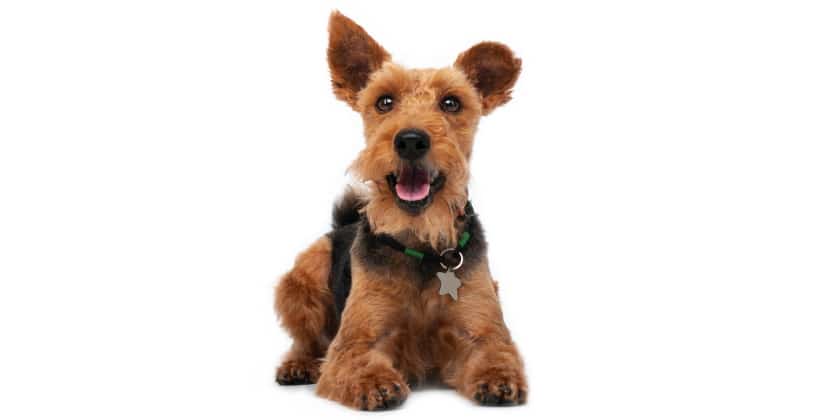
What is the temperament of a Welsh Terrier?
- Intelligent
- Friendly
- Spirited
- Alert
- Energetic
- Courageous
Are Welsh Terriers hard to potty train?
The Welsh Terrier is an intelligent dog breed that is easy to housetrain. You’ll need to be firm and consistent with this dog breed and start housetraining during puppyhood.
Are Welsh Terriers high maintenance?
Welsh Terriers don’t shed much, but they require more effort than the average dog to brush and groom. They are not high-maintenance, but you’ll still have to groom this breed regularly because this is a double-coated dog breed with a soft undercoat and wiry, dense outer coat.
Do Welsh Terriers bark a lot?
Most Welsh Terriers are friendly, spirited, and outgoing with everyone they meet. Through proper socialization during puppyhood and positive dog training starting at a young age, you’ll help develop confidence. The feisty Welsh Terrier will always sound the alert if there’s anything unusual. Excessive barking may be an issue if your Welsh terrier is bored or lonely. This will apply to all dog breeds.
Are Welsh Terriers aggressive?
No, this is an affectionate and loyal dog breed. Welsh Terriers enjoy spending time with their family and are good with older children. Though they generally get along with other dog breeds and pets, you need to properly socialize them from a young age.
How Intelligent are Welsh Terriers?
The aggressive and courageous Welsh Terrier is friendly and quirky. This breed is intelligent, vocal, fast to chase, and makes for a fun companion dog breed. The Welsh Terrier may be stubborn and persistent without positive dog training and socialization.
What is the average lifespan of a Welsh Terrier?
12 – 15 years
Do Welsh Terriers shed hair?
Welsh Terriers are born mostly all black, and during the first year, they change color to standard black and tan grizzle. The Welsh Terrier does not shed. However, their coat needs regular grooming, including brushing and sometimes a hand strip.
Is the Welsh Terrier good with children?
Yes, though this breed is strong-willed and feisty, they make for terrific companion pets.
How much exercise does a Welsh Terrier need?
Welsh terriers are active and can even be hyperactive if they don’t get enough exercise every day.
How often should you wash a Welsh Terrier?
The general rule of thumb for dog bathing is to bathe your dog when he’s dirty or after he has spent time outside playing in the mud or dirt. Wire-coated dogs can be washed more often, often within a 4-6-week range. Their coat should smell fresh and look shiny, with no loose hair.
Is a Welsh Terrier hypoallergenic?
Yes. Welsh Terriers hardly ever shed. Being a non-shedding dog breed means that they’re less likely to bother people with allergies.
How much do Welsh Terrier puppies cost?
Getting a Welsh Terrier puppy from a breeder can be very expensive. Prices will depend on the breeder and the pup’s pedigree and can range from $1,000 to a couple of thousand dollars.

Brilliant description of the Breed